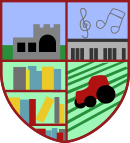Languages
Intent
At Newborough we believe learning a foreign language provides a valuable educational, social and cultural experience for the pupils. Pupils will develop linguistic competence, extend their knowledge of language and explore differences and similarities between English and other languages. Learning a selection of other languages will raise the children's awareness of the multilingual and multicultural world. MFL will also provide an excellent opportunity for cross-curricular links and for reinforcement of knowledge, skills and understanding developed in other subject areas.
Implementation
The curriculum is based on the National Curriculum statutory requirements of 2014 for Modern Foreign Languages. The intention is to foster a positive attitude to learning of MFL. The online resource Rising Stars French, is the main resource for language learning within the school. Rising Stars French is the new, improved scheme for Primary French language learning. Based on Eurostars, the updated program comprises an online progression framework, consisting of 24 units spread over Years 3-6 or four years of learning and an online platform for interactive teaching and assessment. Rising Stars French, has been developed to meet the needs of teachers and learners in primary schools, offering clear progression, engaging sessions, and useful, meaningful assessment opportunities, which can be used to inform future practice. Children should start with Stage 1 in the first year of learning and complete Stage 4 at the end of their fourth year of learning.
What would a French lesson look like at Newborough………
- Children expressing themselves in the foreign language through singing songs, engaging in conversation, role-plays, stories and writing.
- Children engaging in a variety of activities during the course of a lesson, designed to develop a balance of skills across speaking, listening, reading and writing.
- A focus on active learning to build children’s confidence when using the foreign language through bilingual stories and assortment of games (for example Bingo, Simon Says, Pelmanism games).
- Children using resources to scaffold and support their learning, enabling all learners to make progress (for example word mats, flashcards, sentence models and bilingual dictionaries).
- Repetition of new vocabulary and sentence structures throughout the lesson in different ways to encourage retention.
- Children engaging in a variety of interactive resources and games to consolidate pronunciation, grammar and hear different native speakers.
